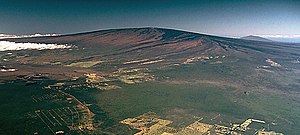

A shield volcano is a type of volcano named for its low profile, resembling a shield lying on the ground. It is formed by the eruption of highly fluid (low viscosity) lava, which travels farther and forms thinner flows than the more viscous lava erupted from a stratovolcano. Repeated eruptions result in the steady accumulation of broad sheets of lava, building up the shield volcano's distinctive form.
Shield volcanoes are found wherever fluid, low-silica lava reaches the surface of a rocky planet. However, they are most characteristic of ocean island volcanism associated with hot spots or with continental rift volcanism.[1] They include the largest active volcanoes on Earth, such as Mauna Loa. Giant shield volcanoes are found on other planets of the Solar System, including Olympus Mons on Mars[2] and Sapas Mons on Venus.[3]
- ^ Schmincke, Hans-Ulrich (2003). Volcanism. Berlin: Springer. pp. 127–128. ISBN 9783540436508.
- ^ Plescia, J. B. (2004). "Morphometric properties of Martian volcanoes". Journal of Geophysical Research. 109 (E3): E03003. Bibcode:2004JGRE..109.3003P. doi:10.1029/2002JE002031.
- ^ Keddie, Susan T.; Head, James W. (1994). "Sapas Mons, Venus: evolution of a large shield volcano". Earth, Moon, and Planets. 65 (2): 129–190. Bibcode:1994EM&P...65..129K. doi:10.1007/BF00644896. S2CID 122532573.